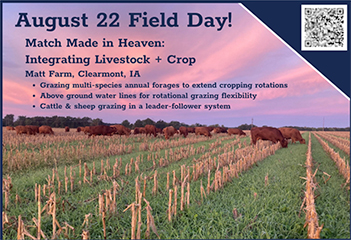Crop/Livestock Integration In Practice: farms share their experiences

7/3/24
CLERMONT, Iowa – Farms across the Midwest are seeing the benefits of adopting even just the first four of the five soil health principles: armoring the soil, minimizing disturbance, increasing plant diversity, and keeping soil covered. But what about going beyond no-till and cover crops? Come see the fifth soil health principle, “integrating livestock,” in practice at Match Made in Heaven field days in six states this summer. Crop/livestock integration will be on display, demonstrating grazing of crop residues, cover crops, and annual forages. Host farmers will share how livestock integration works on their farms and how it benefits soil health as well as the balance sheet. To find the field day in your state check the MMIH website at https://z.umn.edu/field-days.
The field days are part of the regional project “Match Made In Heaven: Livestock + Crops” which takes a look at how integration can work in real life, turning ideas into practice. “In each state we are working with farmers who have been experimenting with integration over a series of years and we’re excited that they’re open to sharing their experiences,” said Amy Fenn, the MMIH Project Coordinator. “There are challenges to bringing livestock onto cropland, we want to see how farmers are overcoming the barriers and how they feel about it after getting a few years in.”
The Iowa field day will be held August 22 on the farm of Rick and Damien Matt in Fayette County. The Matt’s have expanded their corn/soy rotation to include spring & summer annual forages, which they strip-graze with cow/calf pairs followed by a flock of dry ewes. In 2023 the innovative team experimented with mowing and raking the late-summer regrowth into swaths to be grazed in January & February. All are welcome to come see the system in action, along with the above-ground water system the Matt’s have devised to move the animals around without the expense of a buried line. Dinner will follow the field demonstration, attendees are encouraged to register in advance to ensure a plate. Register for the Iowa event online at dkahler@iastate.edu or by calling 563-425-3331.
Case studies are another part of the MMIH project. Six farm case studies will allow readers to “peek under the hood” at how integration works on each farm, both production-wise and financially. “Each operation is unique in how they’ve made integration work and we’re excited to highlight some of their practical innovations in these case studies,” said Laura Paine, the project’s co-lead and former beef grazier. “These farmers are seeing dramatic soil health improvement for their cropping enterprises with the added benefit of reducing fertilizer and pest management costs. Livestock enterprises can use cover crops and crop residue to stretch the grazing season and save on feed costs.” The first two studies, from Iowa and Wisconsin, are complete and have been posted on the project’s website.
-30-
The Iowa Beef Center at Iowa State University was established in 1996 with the goal of supporting the growth and vitality of the state’s beef cattle industry. It comprises faculty and staff from Iowa State University Extension and Outreach, College of Agriculture and Life Sciences and College of Veterinary Medicine, and works to develop and deliver the latest research-based information regarding the beef cattle industry. For more information about IBC, visit www.iowabeefcenter.org.
Contact:
Denise Schwab, ISU Extension and Outreach beef specialist, 319-721-9624, dschwab@iastate.edu
